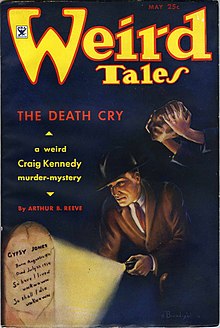Arthur B. Reeve

Arthur Benjamin Reeve (October 15, 1880 - August 9, 1936) was an American mystery writer. He is best known for creating the series character Professor Craig Kennedy, sometimes called "The American Sherlock Holmes", and Kennedy's Dr. Watson-like sidekick Walter Jameson, a newspaper reporter, in 18 detective novels. The bulk of Reeve's fame is based on the 82 Craig Kennedy stories, published in Cosmopolitan magazine between 1910 and 1918. These were collected in book form; with the third collection, the short stories were stitched together into pseudo-novels. The 12-volume Craig Kennedy Stories were released in 1918; it reissued Reeve's books-to-date as a matched set.
Biography
Reeve graduated from Princeton and attended New York Law School. He worked as an editor and journalist before Craig Kennedy propelled him to national fame in 1911. Raised in Brooklyn, he lived most of his professional life at various addresses near the Long Island Sound. In 1932, he moved to Trenton to be nearer his alma mater, Princeton.
Starting with The Exploits of Elaine (1914), Reeve began authoring screenplays. His film career reached its peak in 1919-20, when his name appeared on seven films, most of them serials, three of them starring Harry Houdini. After that—probably because of the film industry's migration to Hollywood and Reeve's desire to remain in the east—Reeve worked more sporadically in film. His career is marked by fiction originally published in newspapers, and a variety of magazines including Boys' Life, Country Gentleman, and Everybody's. Eventually, he was found only in pulps like Detective Fiction Weekly and Detective Story Magazine. In 1927, Reeve entered into a contract (with John S. Lopez) to write a series of film scenarios for notorious millionaire-murderer, Harry K. Thaw, on the subject of fake spiritualists. The deal resulted in a lawsuit when Thaw refused to pay. In late 1928, Reeve declared bankruptcy.
In the 1930s, Reeve rejuvenated his career by becoming an anti-rackets crusader. He hosted a national radio show from July 1930 to March 1931, published a history of the rackets titled The Golden Age of Crime, and the focus of his Craig Kennedy stories completed Reeve's transition from "scientific detective" work to a racket-busting milieu.
During his career, Reeve covered many celebrated crime cases for various newspapers, including the murder of William Desmond Taylor in 1922, and the trial of Lindbergh baby kidnapper, Bruno Hauptmann, who was executed in 1936.
Publications
The most complete biographical and bibliographical information on Reeve is available in From Ghouls to Gangsters: The Career of Arthur B. Reeve Volume 1 (fiction)[citation needed] and Volume 2 (nonfiction) (Locke, editor).[citation needed]
Some of his stories include:

- "The Invisible Ray" (1911), short story in Cosmopolitan, Oct 1912, later reprinted in The Poisoned Pen: The Further Adventures of Craig Kennedy[1]
- "The Campaign Grafter" (November 1912), short story in Hearst's Magazine[2]
- "The Poisoned Pen" (1912), short story in Cosmopolitan May 1912, later reprinted in The Poisoned Pen: The Further Adventures of Craig Kennedy
- The Black Hand (1912), novel)[citation needed]
- Constance Dunlap (1913)[citation needed]
- "The Dream Doctor" (1913), short story in Cosmopolitan August, 1913, later reprinted in The Dream Doctor: The Further Adventures of Craig Kennedy
- Guy Garrick (1914)[citation needed], later reprinted in Guy Garrick: The Further Adventures of Craig Kennedy
- The Exploits of Elaine (1914), film serial
- Gold of the Gods (1915)[citation needed]
- The Romance of Elaine (1915), silent film (the sequel to The Exploits of Elaine)
- The Problem of the Steel Door ([when?])[citation needed]
- The War Terror (1915)[citation needed], later reprinted in The War Terror: The Further Adventures of Craig Kennedy
- The Ear In The Wall (1916)[citation needed]
- "The Treasure-Train" (1916) short story in Cosmopolitan January 1916, later reprinted in The Treasure Train: The Further Adventures of Craig Kennedy
- The Soul Scar (1919)
- The Master Mystery (1919), silent film
- The Grim Game (1919), silent film
- Terror Island (1920), silent film
- The Film Mystery (1921)[citation needed]
- The Radio Detective (Boys' Life 1925 serial, 1926 film serial, and novelization)
- The White Slave (1927), silent film
- The Golden Age of Crime (1931)[citation needed]
- "The Death Cry", the cover story in Weird Tales (May 1935)
- The Stars Scream Murder (1936)[3]
References
- ^ Reeve, Arthur B. (1911). "The Invisible Ray". The Poisoned Pen: The Further Adventures of Craig Kennedy. New York: Grosset and Dunlap.
- ^ Reeve, Arthur B. (November 1912). "The Campaign Grafter" (PDF). Hearst's Magazine. Archived from the original (PDF) on 2016-04-25.
{{cite news}}: Unknown parameter|deadurl=ignored (|url-status=suggested) (help) - ^ Reeve, Arthur B. (1936). The Stars Scream Murder (First ed.). D. Appleton-Century. ASIN B00085TF58.
External links
 Works by or about Arthur Benjamin Reeve at Wikisource
Works by or about Arthur Benjamin Reeve at Wikisource- Works by Arthur B. Reeve at Project Gutenberg
- Works by or about Arthur B. Reeve at the Internet Archive
- Works by Arthur B. Reeve at LibriVox (public domain audiobooks)

- Arthur B. Reeve at IMDb
